- Home
- Johnny D. Boggs
Buckskin, Bloomers, and Me Page 9
Buckskin, Bloomers, and Me Read online
Page 9
Pearl Murphy hadn’t said nothing. Nobody else had, neither. So she waited till folks stopped starring at … Buckskin and me … then said: “Does anyone have any objections if I yield the floor to Mr. Compton?” She wasn’t asking everyone, of course, just Maggie Casey, who didn’t say nothing, because Pearl Murphy raised her noggin and smiled at Buckskin and said: “The floor is yours, Billy.”
So Buckskin stood, but he didn’t step out of the aisle, only kind of leaned against the edge of the pew and begun talking, but not until he took off his wig.
“Thank you, Miss Murphy. Thank all of you. So my understanding is that you want to play men’s teams.”
“We’ve been playing men,” Maggie Casey said without looking at Buckskin. “Or maybe you think Oskaloosa had girls deck out in men’s garb and grow beards in today’s game.”
“What we want, what we need,” Agnes McGuire said, “is to play a team of men …”
Buckskin grinned and finished the sentence for her. “Without Waddell, McConnell, my young pard here, and me.”
“That’s the only way we can prove that women are as good as men,” Carrie Cassady said as soft as a mouse.
What she said left me surprised. I could expect that kind of thinking from Maggie Casey, but Carrie … I mean … she hailed from Salem, Ohio, wherever that was.
“Amen, sister,” said Katie Maloney, patting Carrie’s arm—only Katie Maloney’s patting was more like pounding, and Carrie quickly took her arm off the back of the pew and out of range.
“Why do you need to beat a team of men ballists?” Buckskin asked.
“Because this is the twentieth century,” Maggie said.
I feared things might get out of control, just as they had done back at that Harvey House.
“Don’t you think we ought to have the right to play for the Cubs or the White Sox?” Katie Maloney hollered.
“Or even the Boston Americans?” added Sue Malarkey.
“At least we deserve the chance to try out for a professional team,” sweet, pretty Ruth Eagan said, but she didn’t yell like Maggie, Katie, and Sue had. Nor did she whisper like Carrie.
“Or the Lincoln Ducklings, or some other Western League team. Or even Oskaloosa, if we had to live in this sinkhole,” said someone whose voice I couldn’t recognize and who didn’t really say sinkhole.
Buckskin hooked his thumb toward the closed door. “The Negroes were kind enough to let you use their house of worship to hold this meeting. How many Negro men do you see playing for the Chicago teams, or even the Boston Americans, or the Lincoln Ducklings, or any professional team?”
“Because …” Maude Sullivan started to say, but didn’t finish.
Ruth, though, she said something that Buckskin later defined as profound, telling me to look up that word, profound, in the dictionary he’d bought. I picked up my own copy of Webster’s Common School Dictionary later when we were in Denver.
“There aren’t any playing for the Bloomer Girls, either.”
Things got quiet, like we was in a church—exactly where we were—but that silence lasted only about five or six seconds.
“Women like us were getting at least a chance ten years ago,” Maggie Casey, said, and she was ugly when she was standing. She kind of nudged Pearl Murphy toward the pews on the other side of the aisle. “Lizzie Arlington played for the Reds. The Cincinnati Reds. And I bet you and your little puppy dog”—reckon I was the little puppy dog—“sitting there about to wet his britches couldn’t hit Lizzie’s fastball.”
By grab, Buckskin just grinned. “I probably couldn’t,” he said. “And neither could you. Any of you.”
Not grinning, Maggie Casey come down the aisle like Satan had latched upon her soul, and said all sorts of things that one shouldn’t never say in public and absolutely never in a church, especially in a church, a Baptist church, in Kansas.
Buckskin, though, he weren’t scairt like me, even though his bat bag lay on the floor opposite of me. Maggie Casey looked ready to unleash all of her anger out on him before he could ever get to that rifle, but Buckskin didn’t budge an inch.
He said: “Ladies, you couldn’t even beat Oskaloosa.”
Being the truth, them words must’ve registered even to Maggie Casey, on account that she stopped her charge. The room turned quiet.
Buckskin said: “You want suffrage. You want equality. I understand that. But baseball is a tough sport. Professional baseball is even harder. And you need to face this fact … men are stronger than women.”
Pearl Murphy said: “Say that after you’ve pushed a ten-pound baby outta your body through your …”
Well, my face turned redder than the Oskaloosa’s lace-up shirts or the stripes on their pristine white caps.
Buckskin, he remained unflappable, but when you mostly play third base, you get used to hard shots coming right at you. He said: “I readily admit that this species would have died out thousands of years ago had reproduction been placed upon us.”
I didn’t figure out what they was talking about till I wrote down these words just now.
The Bloomer Girls hadn’t expected that.
“Is this what you want? Really. Deep down in your soul?” Buckskin kept staring right through Maggie Casey, who looked like she didn’t know what she should do. “Because the fans aren’t going to call you ‘New Women’ … or ‘Gibson Girl,’ or anything like that. You’ll be called freaks. And much, much worse.”
He stopped talking, but the church weren’t silent long.
Pearl Murphy said: “Maybe at third base, you can’t hear what those skinflints who line up beyond the outfield fence call us.”
“I’m not deaf,” Buckskin said.
“American women were making progress,” Maude Sullivan said, “even into the ’90s. Then the twentieth century rolls around, and we’re back in the Dark Ages.”
“Except in Wyoming,” Ruth pointed out.
“Fool Wyoming,” Maggie Casey snapped, but, yeah, it wasn’t fool that she said. “They have to let women vote and hold office, because there aren’t enough men stupid enough to live in that windblown perdition. If women didn’t live there, they’d have pronghorns and jackrabbits as mayors and justices.”
Ruth’s face turned redder than mine had, but now my ears were burning hot, and if Maggie Casey had been a fellow, I’d have punched her in the nose for conversing that way to a sweet girl who could play a decent first base and would keep on playing that way once her new first baseman’s mitt showed up in Axtell.
“So what is it that you can do for us, mister? ” Maggie Casey asked, and the way she said mister wasn’t what anybody would call respectful.
“I want to coach you,” Buckskin said.
“Isn’t that what Egghead Norris does?” Maud Nelson asked.
“He’s a manager,” Buckskin said. “A businessman. I can coach.” He glanced at me. “With my pard here to help out some.”
Chapter Twelve
Holton Signal
Holton, Kansas • June 7, 1906
These are no ugly women, but it is safe to say that the Bloomer Girls were less beautiful than any women ever seen in Holton.
“Best put your wig back on,” I told Buckskin when he was walking out of the Baptist church where he had spent some private time talking with Pearl, Maggie, and Katie about “things,” as he said, whilst I didn’t have to take off no wig ’cause I didn’t wear one, my hair being so long and so virginal, whatever that means. I leaned against the frame wall of the Baptist church and started thinking that it was a woeful life to be living if I didn’t even have to wear no wig to get mistook for a female. Next thing I knew, sweet Ruth had come up to me, smiling.
Not smiling like someone had told her a funny joke, but a pleasing, plumb nice smile.
“Good evening,” she started, pausing as her smile brightened, then calling me
by my rightful name, not Lucy Totton.
I said: “I’m sorry to have frauded you, Miss Ruth.”
Cocking her head a mite, pursing them rosy lips, Ruth said: “Frauded me?”
My head bobbed, before I recollected to take off my ball cap, which I hadn’t taken off whilst inside the church. I thought that God wouldn’t be too happy about that, but He likely already felt perturbed from all them Sunday ball games we had taken part in.
“Passing myself off as a Bloomer Girl,” I explained.
She grinned again. “I think I’m old enough to know the difference between a nice young man and a woman who plays second base like a man.”
My shoulders stopped sagging. She’d called me a man, not a boy.
The wind picked up, not that it wasn’t blowing already, because the blamed wind never stopped blowing in Kansas, and I tried to think of something sweet and smart to say.
The other Bloomer Girls had all left, so it was me and Ruth who thanked the folks, who were waiting outside, for loaning us their church, and then me and Ruth left. We weren’t talking, or holding hands, just walking and enjoying the breeze. Till a gust blew sand in my eyes and took Ruth’s baseball cap all the way into the center of a corral outside a livery. I had to go in and fetch it, then we continued on to the Missouri Pacific depot where we waited for our train.
It took us to Holton, which wasn’t but one or two stops to the northwest on the MP. We all got settled into our hotel easy enough, and went to bed, though I’d slept plenty on the train.
* * * * *
It was potbellied man who called hisself Mayor Kuhn who greeted us before the game, as we was climbing into the omnibus to take us from the hotel to the field where our crew had put up the equipment earlier that morning. The mayor proclaimed this to be the greatest event in the history of Holton. He paused angrily when McConnell spit between his teeth at this announcement. Though he wore spectacles thicker than the bottom of a beer bottle, the mayor looked long and hard at McConnell, who had forgotten to shave that morning, because Holton, unlike Perry, wasn’t right yet upholding the state laws that outlawed liquor. Flustered now, Mayor Kuhn forgot what he was supposed to say next. We waited, getting bored, and at length Mr. Norris thanked the mayor for his generosity, and we climbed onto the omnibus. Buckskin, me, and Waddell had to help the still-roostered McConnell get aboard. We took off and got to the field where another person give a talk.
Unlike the mayor, she didn’t forget her speech at all—not one word.
“What you women are doing …” she began.
That’s when McConnell burped, and I mean he burped so loud that they likely heard him way down in Oskaloosa.
The woman stopped, stared at McConnell, and it wasn’t no kind or forgiving stare. It was a look that commanded respect from everyone, even Maggie Casey. Or, as it turned out, Nelse “Nellie” McConnell.
“Beg your pardon,” McConnell said before he slumped down onto our bench.
“What you women are doing,” she said, only this time she nodded at the individual girls, ignoring Buckskin, Mr. Norris, and Waddell, though she did, gosh dang it, nod at me, “is a small but important step on our way to equality.”
She introduced herself as Ella Brown, saying she taught at Campbell College, wherever that was, and that for two years she had served as the city attorney in Holton, and she meant this here Holton in Kansas and not nowheres up in Wyoming.
“Look around you when you leave our fair city,” she said. “Our Hook and Ladder Company has three engines, and our volunteers protect not only the city but the county. We’ve taxed dogs since ’72.”
That caused Buckskin to lean and whisper: “Do the dogs pay those taxes in dollar bills or doggoned barks?” But luckily Miss Ella Brown was still talking, so she mustn’t have heard Buckskin.
“The sidewalks around the town square, once plank, are now brick or iron. Plans are in the works for sewers, for drinking fountains on each corner of the square, and to have our houses numbered. But is this progress?”
“No!” the Bloomers bellowed, which caused Mr. Norris to cuss, because he messed up the lineup card he was filling out whilst sitting on the bench and cussing the now sleeping McConnell for being a walking whiskey vat.
Ella Brown didn’t act like she’d heard that neither, but we all knew she had. Jo-fired she was, and so were our Bloomer Girls. “I,” she said, “was the first woman to dare to enter the law department at KU in 1890. But that is nothing compared to what you young, strong women are doing. Do you know how long it took the St. Louis Browns to put even a ladies’ toilets in their baseball stadium? Oh, they wanted women to come to their games, thinking it would lessen the hooliganism at those sordid affairs in that detestable beer and whiskey league. So women came to stadiums across our United States, paying twenty-five cents like men, to cheer on the team that represented their city, their town, their league. They called those women ‘krankets.’ As in cranks, for any women who cheered on baseball, surely must be eccentric or just plain mad.”
Again, Buckskin leaned over. “She ought to be a preacher,” he whispered.
“Oh, it’s fine for women to play baseball in college, at Vassar or Mount Holyoke, and, sure, bloomers are great for women if they want to ride a bicycle. Men even allowed us to take part in pedestrianism in the ’70s. Walking is fitting exercise for this ‘fairer sex,’ especially, the male organizers said, if they can make all women competitors wear offensive bows and freakish attire. Well, we are not freaks, and we walk, we ride bicycles, and if we want to play baseball, we will play baseball, because it is our right. This is nineteen-aught-six. Almost forty years ago, Wyoming gave us suffrage, and do you know how many states have followed suit? Three. Three more states … Colorado, Utah, and Idaho. Women ballists, we have the National Consumers League, the Woman’s Christian Temperance Union, and Women’s Trade Union League. And you, the National Bloomer Girls, are the first step to our goal. But our goal is not for a Women’s National League of Professional Baseball Clubs or some Women’s American League of Professional Baseball Clubs, but, by thunder, professional, semi-professional, and town-ball clubs that allow women and men to compete together, to compete as a team. We love our sports, and we should be allowed to play them. You are taking our first step to equality. And I dream that one day, I won’t hear the ridiculous statement … ‘May the best man win,’ but ‘May the best player win’ … so …”
That’s when Buckskin leaned over and whispered: “Better.”
Which caused me to miss most of the rest of what the lady lawyer said, not that I was paying that much attention to her anyway, because she was shouting like she was an engineer who spent too much time in a locomotive cab and had gone practically deaf, so if he was deaf, he figured nobody could hear what he was saying, which didn’t make no sense, but you couldn’t explain that to a deaf engineer. Or this lady lawyer.
Still, I got most of what the lady lawyer said, because the reporter for the Horton Headlight put it all down in the paper that Buckskin bought a copy of the next morning before we rode the train up to Axtell, which is where I went to the post office with Ruth to fetch her new first basewoman’s mitt that had been sent special order from St. Louis.
“What?” I didn’t speak in no whisper but shouted it, on account it was the only way Buckskin could hear what I was saying above the commotion them Bloomer Girls and Miss Brown was making, hollering something fierce, stomping their baseball shoes, and banging their bats on the ground.
“Better,” Buckskin said. “Not best. Comparatives and superlatives.”
“What?” I repeated.
“Better is used when comparing two things. Best is …”
“What?”
Buckskin screamed in my ear: “I’ll tell you after the game!”
Which the Bloomer Girls won, fourteen to three. Nobody from Horton was happy about that, excepting that lady lawye
r, who, all giddy, slapped my shoulder and said I’d done a crackerjack job.
That put me in such a foul mood that I sulked all that night in the hotel, all through breakfast the next morning, and even more when Buckskin showed me The Headlight on the train.
It just ain’t right that a fellow my age gets mistaken for a gal. So irritated was I that the rhythm of the train couldn’t even help put me to sleep.
Buckskin, seeing I couldn’t sleep, nudged me and said: “Let’s go.”
We went to the smoking car, and Buckskin slid into the seat next to Mr. Norris. I took the seat closest to the window and tried to breathe in air that didn’t stink of cigars, pipes, and cigarettes, and closed my eyes so they didn’t burn, but that’s not to say I wasn’t listening to what Buckskin and Mr. Norris were conversing about.
“Our girls played well yesterday,” Buckskin said.
“I could have pulled a muffin nine from the charity ward at Saint Joseph’s and beaten those losers.” Mr. Norris kept playing solitaire using his hard-backed carrying case for a table. I knew this even with my eyes closed, ’cause I could hear the slap of the cards.
“They did it without McConnell catching.”
“They didn’t do it without you catching, Waddell pitching, and the boy at second.”
“I thought Carrie did a good job at third.”
The slapping noise of the cards stopped.
“They didn’t have a batter on the whole team who could figure out Russ’s curveball or fastball. That Quaker half-wit fielded two slow rollers. That loud-mouthed, pettifogging petticoat of a solicitor could’ve done that.”

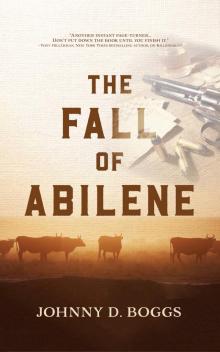 The Fall of Abilene
The Fall of Abilene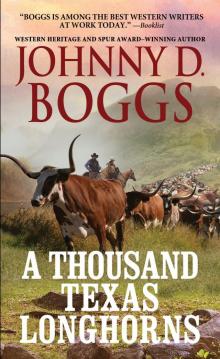 A Thousand Texas Longhorns
A Thousand Texas Longhorns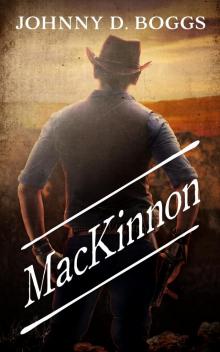 MacKinnon
MacKinnon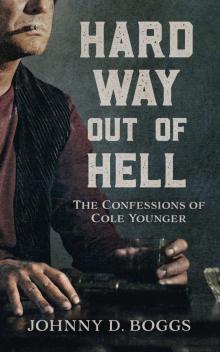 Hard Way Out of Hell
Hard Way Out of Hell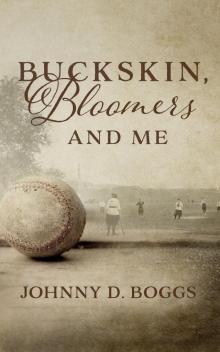 Buckskin, Bloomers, and Me
Buckskin, Bloomers, and Me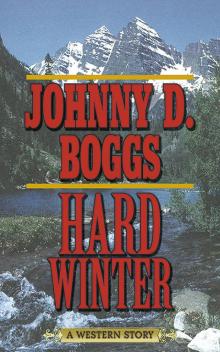 Hard Winter
Hard Winter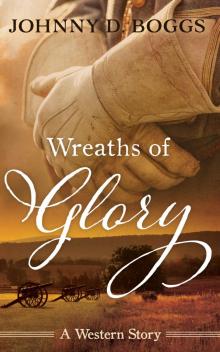 Wreaths of Glory
Wreaths of Glory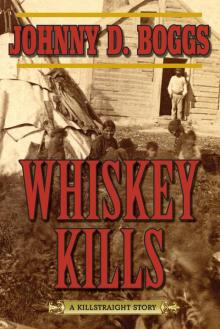 Whiskey Kills
Whiskey Kills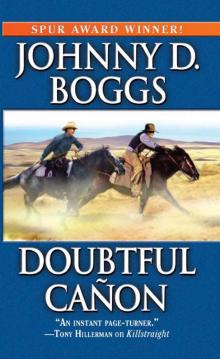 Doubtful Canon
Doubtful Canon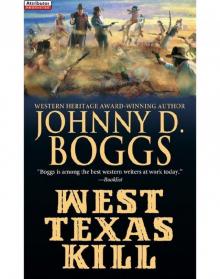 West Texas Kill
West Texas Kill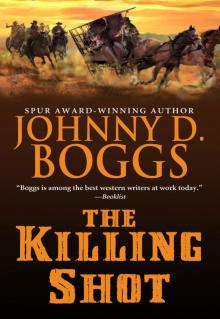 The Killing Shot
The Killing Shot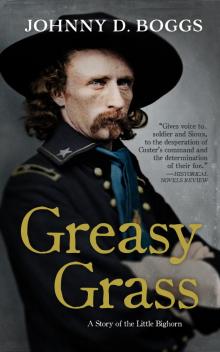 Greasy Grass
Greasy Grass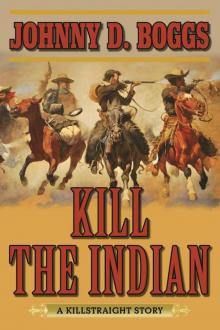 Kill the Indian
Kill the Indian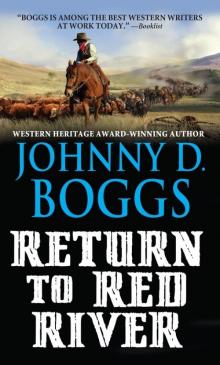 Return to Red River
Return to Red River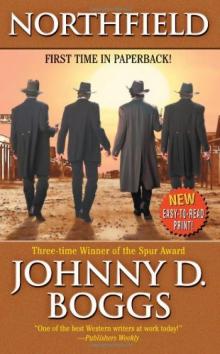 Northfield
Northfield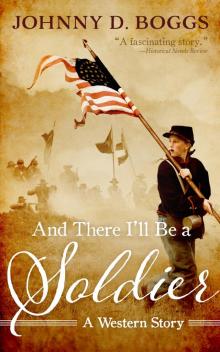 And There I’ll Be a Soldier
And There I’ll Be a Soldier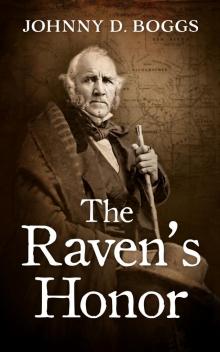 The Raven's Honor
The Raven's Honor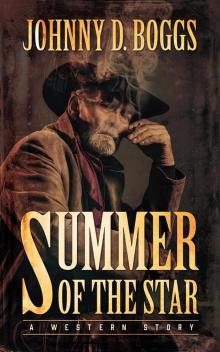 Summer of the Star
Summer of the Star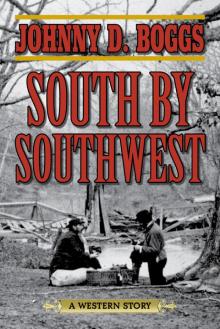 South by Southwest
South by Southwest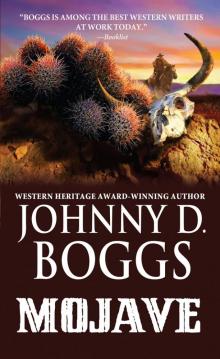 Mojave
Mojave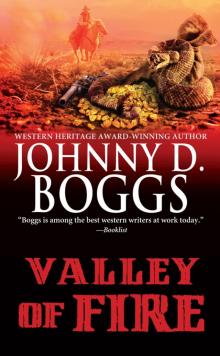 Valley of Fire
Valley of Fire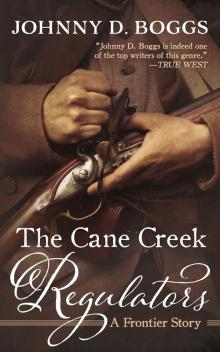 The Cane Creek Regulators
The Cane Creek Regulators